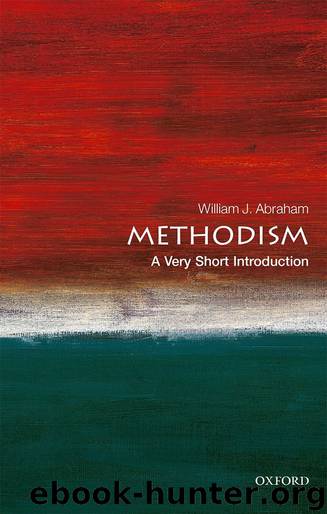Methodism by William J. Abraham

Author:William J. Abraham
Language: eng
Format: epub
ISBN: 9780192523266
Publisher: OUP Oxford
Published: 2019-03-03T16:00:00+00:00
Chapter 6
The practices of Methodism
A crucial study tour
Shortly after his Aldersgate experience John Wesley embarked on a study tour of continental Europe. He was especially interested in visiting the Moravian communities whose members had such an impact on him both in Georgia and in England. The Moravians were not particularly impressed by this strange Englishman in their midst; they were not sure he was a real Christian and refused to allow him to participate in the Lord’s Supper. Yet Wesley did not appear in the least annoyed at this. He was too busy sorting through the revolution that was bubbling up in his life.
On the one hand, he was still working through how best to understand what had happened to him. The Moravians had taught him to expect not just assurance about his salvation but also immediate victory over evil and persistent joy. In time the last two promises did not pan out; there was no immediate victory over evil and no persistent joy. The first remained a lasting element in his spiritual life, despite a short lapse in his middle years when he experienced a critical bout of scepticism about his status as a Christian. He wrestled for years on how best to think of new birth for himself and others.
On the other hand, Wesley had discovered that the rigid system of the first efforts at organizing Methodism at Oxford simply did not work in the New World. We might say that a second effort to make Methodism work failed and he was now looking for a third way to establish Methodism as an effective force for reform and renewal. Thus he was eager to observe what the Moravians believed and to examine their practices of prayer and spiritual formation that had been so effective in generating their confidence and their amazing missionary zeal. He had become an informal pragmatist in search of ways of expressing the evangelistic zeal that was jointly generated by his theological convictions and his new-found confidence. He was attending to the place of outward forms as they related to inward religion. He was exploring what social practices best served his desire to see holiness become a living reality in the nation and the church.
There was nothing especially original in the way that Wesley described what was at issue. He was exploring what he called the means of grace. In his canonical sermons this topic shows up third from last in the first set of sermons that explain what it is to become a Christian and helps prepare the way for the second set that explore what it is to be a Christian. The idea behind the means of grace is a simple one. Divine grace—God’s generosity in forgiving sinners and God’s energy in remaking them—does not generally come as a bolt from the blue. It is mediated through corporate practices. God can always choose to operate directly, as happened most dramatically in the conversion of the apostle Paul, but exceptions do not make for a rule.
Download
This site does not store any files on its server. We only index and link to content provided by other sites. Please contact the content providers to delete copyright contents if any and email us, we'll remove relevant links or contents immediately.
| Anglican | Baptist |
| Book of Common Prayer | Calvinist |
| Episcopalian | Inspirational |
| Lutheran | Methodist |
| Pentecostal & Charismatic | Presbyterian |
| Quaker | Seventh-Day Adventist |
| Shaker | Theology |
Angels by Billy Graham(1926)
How To Be Born Again by Billy Graham(1781)
Peace with God by Billy Graham(1689)
Unbroken Curses by Rebecca Brown & Daniel Yoder(1575)
God's Prophetic Symbolism in Everyday Life by Adam Thompson & Adrian Beale(1497)
The School of Biblical Evangelism by Ray Comfort(1438)
Call by Rick Joyner(1430)
Martin Luther: The Man Who Rediscovered God and Changed the World by Eric Metaxas(1399)
Power over the Enemy by John Osteen & Joel Osteen(1354)
Jonathan Edwards: A Life by Marsden George M(1236)
Fresh Wind, Fresh Fire by Jim Cymbala(1234)
Prayers That Bring Healing and Activate Blessings: Experience the Protection, Power, and Favor of God by John Eckhardt(1222)
Liturgy of the Ordinary by Tish Harrison Warren(1220)
The Supernatural Power of a Transformed Mind Expanded Edition: Access to a Life of Miracles by Bill Johnson(1207)
Unmasking the Devil: Strategies to Defeat Eternity's Greatest Enemy by John Ramirez(1206)
An Altar in the World by Barbara Brown Taylor(1195)
Reformation Theology by Littlejohn Bradford(1187)
Seeing the Voice of God: What God Is Telling You through Dreams and Visions by Smith Laura Harris(1142)
Martin Luther by Mansch Larry D.; Peters Curtis H.;(1131)
